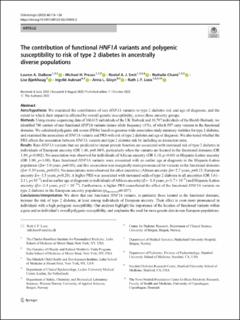| dc.description.abstract | Aims/hypothesis: We examined the contribution of rare HNF1A variants to type 2 diabetes risk and age of diagnosis, and the extent to which their impact is affected by overall genetic susceptibility, across three ancestry groups.
Methods: Using exome sequencing data of 160,615 individuals of the UK Biobank and 18,797 individuals of the BioMe Biobank, we identified 746 carriers of rare functional HNF1A variants (minor allele frequency ≤1%), of which 507 carry variants in the functional domains. We calculated polygenic risk scores (PRSs) based on genome-wide association study summary statistics for type 2 diabetes, and examined the association of HNF1A variants and PRS with risk of type 2 diabetes and age of diagnosis. We also tested whether the PRS affects the association between HNF1A variants and type 2 diabetes risk by including an interaction term.
Results: Rare HNF1A variants that are predicted to impair protein function are associated with increased risk of type 2 diabetes in individuals of European ancestry (OR 1.46, p=0.049), particularly when the variants are located in the functional domains (OR 1.89, p=0.002). No association was observed for individuals of African ancestry (OR 1.10, p=0.60) or Hispanic-Latino ancestry (OR 1.00, p=1.00). Rare functional HNF1A variants were associated with an earlier age at diagnosis in the Hispanic-Latino population (β=−5.0 years, p=0.03), and this association was marginally more pronounced for variants in the functional domains (β=−5.59 years, p=0.03). No associations were observed for other ancestries (African ancestry β=−2.7 years, p=0.13; European ancestry β=−3.5 years, p=0.20). A higher PRS was associated with increased odds of type 2 diabetes in all ancestries (OR 1.61–2.11, p<10−5) and an earlier age at diagnosis in individuals of African ancestry (β=−1.4 years, p=3.7 × 10−6) and Hispanic-Latino ancestry (β=−2.4 years, p<2 × 10−16). Furthermore, a higher PRS exacerbated the effect of the functional HNF1A variants on type 2 diabetes in the European ancestry population (pinteraction=0.037).
Conclusions/interpretation: We show that rare functional HNF1A variants, in particular those located in the functional domains, increase the risk of type 2 diabetes, at least among individuals of European ancestry. Their effect is even more pronounced in individuals with a high polygenic susceptibility. Our analyses highlight the importance of the location of functional variants within a gene and an individual’s overall polygenic susceptibility, and emphasise the need for more genetic data in non-European populations. | en_US |

